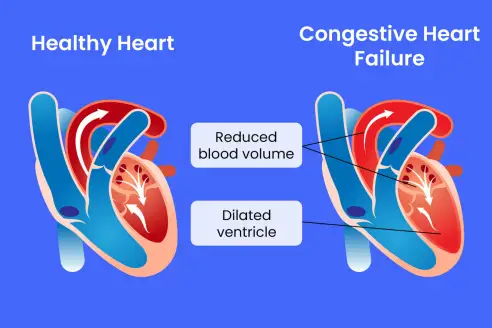Understanding Congestive Heart Failure: Causes, Symptoms, Diagnosis, and Treatments

Congestive heart failure (CHF) is a complex condition characterized by the heart’s inability to pump enough blood to meet the body’s needs for blood and oxygen. This can lead to a buildup of fluid in the lungs and surrounding tissues, causing various symptoms that significantly impact quality of life. While CHF is a serious and chronic condition, advancements in medicine and lifestyle changes can help manage symptoms and improve outcomes.
What Causes Congestive Heart Failure?
CHF can result from a variety of underlying conditions, most commonly those that damage or weaken the heart. Some of the primary causes include:
Coronary Artery Disease (CAD): The most frequent cause of CHF, CAD occurs when the arteries supplying blood to the heart become narrowed or blocked, impairing blood flow.
Hypertension (High Blood Pressure): Chronic hypertension forces the heart to work harder to pump blood, leading to muscle thickening and eventual heart failure.
Myocardial Infarction (Heart Attack): Damage from a heart attack can directly weaken the heart muscle and lead to CHF.
Cardiomyopathy: This refers to diseases of the heart muscle, which can be caused by factors such as genetics, long-term alcohol abuse, infections, and certain medications.
Heart Valve Disorders: Malfunctioning heart valves can disrupt blood flow within the heart, contributing to heart failure.
Arrhythmias: Irregular heart rhythms can lead to inadequate blood flow, straining the heart.
Other Conditions: Diabetes, obesity, thyroid disorders, and certain lung diseases can also contribute to the development of congestive heart failure.
Symptoms of Congestive Heart Failure
The symptoms of CHF can vary based on the severity of the condition, but common signs include:
Shortness of Breath: This may occur during activity or while lying down.
Swelling: Fluid buildup can cause swelling in the legs, ankles, or abdomen.
Fatigue: A general sense of tiredness can be present.
Cough: A persistent cough, sometimes with white or pink mucus, may indicate fluid in the lungs.
Rapid or Irregular Heartbeat: Palpitations can occur as the heart tries to compensate for decreased function.
Decreased Ability to Exercise: A noticeable reduction in exercise tolerance can be a key symptom.
Diagnosis of Congestive Heart Failure
The diagnosis of CHF typically involves a combination of physical examinations, patient history, and various tests. Physicians may use:
Physical Examination: Checking for signs of fluid retention and other symptoms.
Blood Tests: Measuring levels of substances like BNP (B-type natriuretic peptide), which helps assess heart function.
Chest X-ray: To identify fluid buildup around the lungs or heart enlargement.
Electrocardiogram (ECG): To measure electrical activity and identify arrhythmias.
Echocardiogram: An ultrasound of the heart that assesses pumping capacity and structural abnormalities.
Treatment and Management of Congestive Heart Failure
While there is no cure for CHF, various treatment strategies can help manage symptoms and improve quality of life. Approaches include:
Medications: Diuretics (to reduce fluid buildup), ACE inhibitors, beta-blockers, and aldosterone antagonists are commonly prescribed to help manage heart function.
Lifestyle Changes: Adopting heart-healthy habits such as maintaining a balanced diet (low in sodium), regular physical activity, weight management, and avoiding tobacco and excessive alcohol can significantly affect outcomes.
Monitoring Symptoms: Patients are often instructed to monitor their weight and report any sudden changes, which can indicate worsening heart failure.
Medical Devices: Advanced therapies such as implantable cardioverter-defibrillators (ICDs) or cardiac resynchronization therapy (CRT) may be appropriate for some patients.
Surgery: In severe cases, procedures such as heart valve repair or replacement, coronary artery bypass grafting (CABG), or even heart transplants may be necessary.
Living with Congestive Heart Failure
Living with CHF requires careful management and support. Establishing a strong relationship with a healthcare team is essential for successful treatment. Education about the condition can empower patients and caregivers to prevent complications and manage symptoms effectively.
Conclusion
Congestive heart failure is a serious yet manageable condition that affects millions worldwide. Understanding the causes, recognizing symptoms early, and embracing a proactive approach to treatment can lead to improved outcomes and enhanced quality of life for individuals affected by this chronic disease. With continued research and advancements in healthcare options, there is hope for better management strategies and potential breakthroughs in treatment for CHF.










